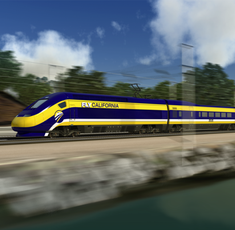by Juliet Williams, Associated Press
SACRAMENTO, Calif. (AP) — The board that oversees California's High-Speed Rail Authority on Thursday unanimously approved a nearly $1 billion contract to start construction on the first leg of the $68 billion bullet train in the Central Valley, clearing the way for work to start as soon as this summer.

The bid from a California-based joint venture was the cheapest out of five received by the state, but had the lowest technical rating for safety and design, drawing public scrutiny and prompting more than an hour of questions to the high-speed rail authority staff from board members. They ultimately voted 6-0 to approve the $985.1 million bid.
The selection has drawn scrutiny after it was revealed that the authority changed its rules for selecting a company after the process was made public, allowing the cheapest bid to be selected even though it had the lowest technical rating for safety and design quality.
Most of the questions from the board appeared intended to show that members had asked questions of officials before they approved the construction package.
"The questions really boil down to, can the successful bidder do the job, and will they do it within the confines of the contract as contemplated by the authority," said board member Jim Hartnett. "The questions that I had were answered to my satisfaction."